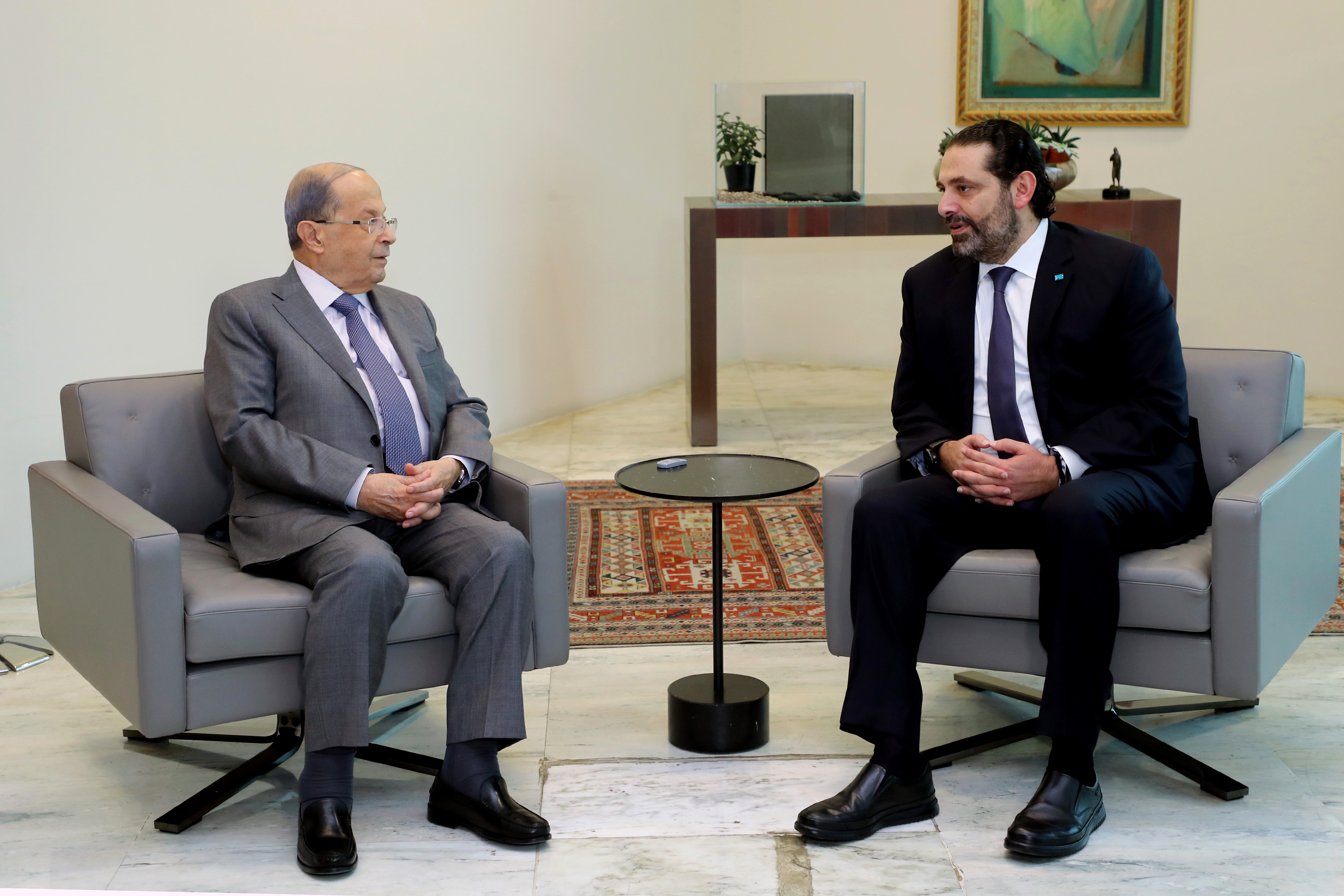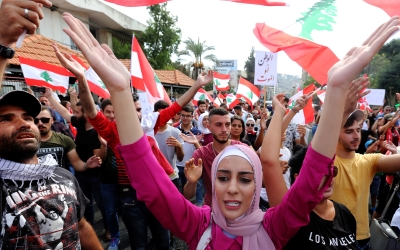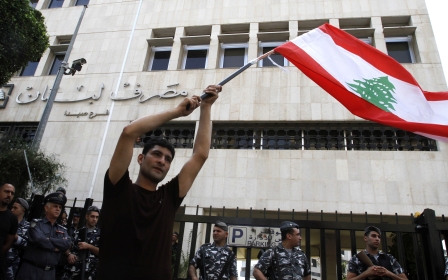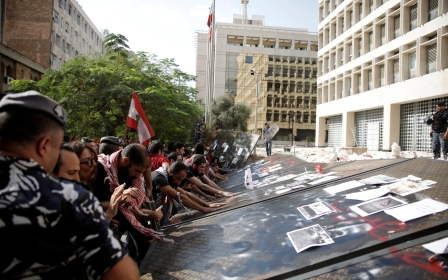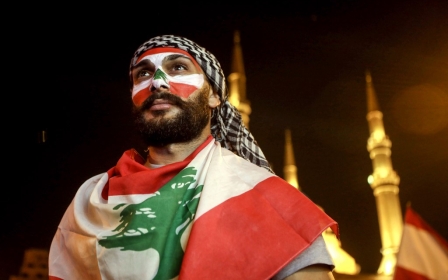One month on: Which regime do the Lebanese want to bring down?
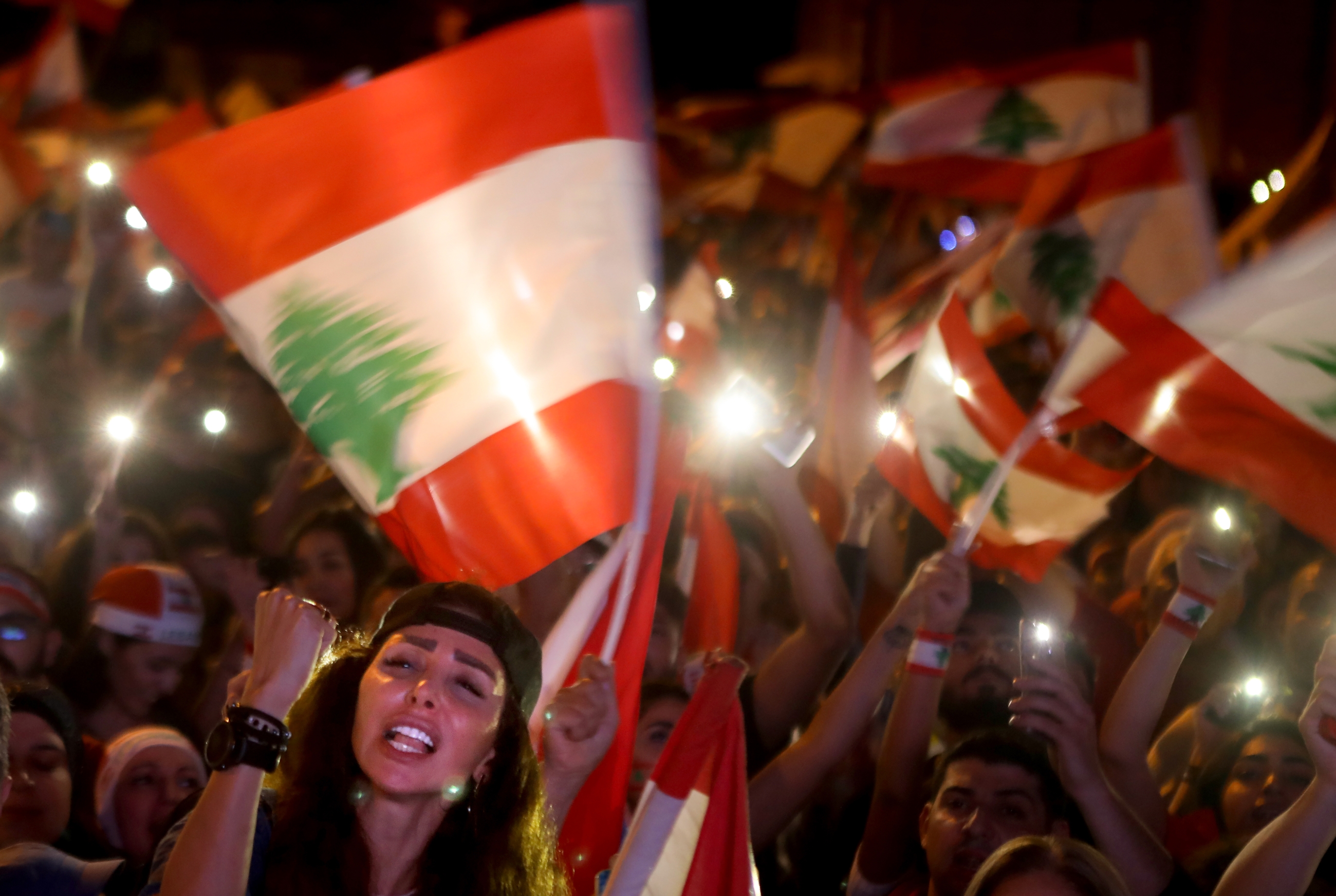
This week, Lebanon’s protest movement enters its first month. Triggered by a government decision to tax WhatsApp calls, the protests have spawned an uprising unprecedented in the country's recent history.
Taxing a free service is very illustrative of how politics work in post-war Lebanon. The ruling class sells the Lebanese citizens what belongs to them while at the same time enriches itself and pauperises average citizens. Effectively, studies show that 28 percent of the Lebanese are very poor and 8 percent are extremely poor, while between 1 and 10 percent of the adult population receives 25 and 55 percent of national income on average.
In other words, these are social protests par excellence whereby people are taking over the streets to express their grievances, whether individual, collective or both.
The three crises
Social protests are not new to Lebanon. On different occasions, several groups have mobilised to demand their economic and social rights (teachers, taxi drivers etc). What makes the ongoing protests unique, however, is that they erupted after three crises have been crystallised: the crisis of the public state, the crisis of the ruling class, and the crisis of society.
New MEE newsletter: Jerusalem Dispatch
Sign up to get the latest insights and analysis on Israel-Palestine, alongside Turkey Unpacked and other MEE newsletters
The state has become irrelevant in the everyday life of the Lebanese, and has never been consolidated as a source of justice for ordinary citizens
It is no secret that the Lebanese state provides few services to society. In fact, since the end of the war in 1990, only 8 percent of the total expenditure of the Lebanese state was spent on public capital investment.
Meanwhile, Lebanese citizens have resorted to alternative sources of services and utilities, which are indirectly or directly connected to the interests of the ruling class such as electricity, water and security services, among many others.
Accordingly, and while the ruling class has captured state institutions, it has simultaneously fulfilled a distributive role by also capturing society through networks of clientelism and patronage. The state, therefore, has become irrelevant in the everyday life of the Lebanese people, and has never been consolidated as a source of justice for ordinary citizens.
A society in crisis
The ruling class is also in crisis as it has found itself struggling in the last couple of years. Due to the regional turmoil there has been an exhaustion of the regional resources that historically fed the clientelist networks of the ruling class.
The ruling class has become completely disconnected from the society
Moreover, recently this ruling class has seen unprecedented intra-elite struggle. In the face of very alarming economic prospects, it has not deployed any serious effort to push through much needed reforms, instead it has become consumed by interpersonal quarrels.
Some of its members have taken very chauvinist and racist stands against not only refugees but also the Lebanese themselves, stirring up memories of the civil war among the latter. In this way, the ruling class has become completely disconnected from society.
Finally, the neoliberal order that was set in place after the civil war has contributed to creating a society in crisis. In the absence of public services, almost all services have been outsourced.
Why are the Lebanese protesting?
+ Show - HideCorruption and clientelism
Lebanon suffers under a complicated, sectarian-based power-sharing political system that has entrenched politicians and their parties in power.
Many of Lebanon's leaders are drawn from families that have dominated the political scene since its independence from France in 1943.
Parties largely claim to represent Lebanese belonging to specific confessions; parliamentary seats and top offices are divided between the 18 officially recognised sects.
However, they have largely become vehicles for corruption and clientelism and struggle to cross Lebanon's fractured political divide to reach consensus for the good of the country.
Lebanese on the streets are now calling for the removal of the entire political class.
Economic crisis
Lebanon's economy has been hit by repeated political deadlocks in recent years. Government finances are strained by a bloated public sector, debt-servicing costs and subsidising the state power producer.
Fitch ratings agency recently downgraded the country's sovereign debt, which stands at $86bn - more than 150 percent of gross domestic product - deep into junk territory.
On 2 September, Lebanon declared a state of economic emergency, vowing to speed up public finance reforms in an acknowledgement of the financial situation afflicting the country.
But the government's recent proposal of austerity measures and tax increase has angered citizens who accuse politicians of corruption, theft and leaving them behind with rising unemployment.
The crisis has caused the unofficial exchange rate to rise to 1,600 Lebanese lira to one US dollar, almost 100 lira over the officially pegged exchange rate of LL 1,507.5.
WhatsApp tax
As the Lebanese government looked to increase revenues in its 2020 budget, it decided on Wednesday to charge citizens $0.20 per day for making voice calls using online applications such as WhatsApp and Viber.
The move would have charged users $6 per month on top of already hefty telecoms bills. Lebanon has some of the highest mobile network prices in the world.
Adding to the country's list of problems - longstanding environmental crises, water and electricity shortages, crumbling infrastructure and lack of state services - is Lebanon's extremely unequal distribution of riches.
According to Lebanese newspaper Al-Akhbar, 1 percent of the wealthiest people in the country own 58 percent of Lebanon’s wealth, while the poorest 50 percent own less than 1 percent.
In a country infamous for being a fiscal haven for the ultra-rich, imposing taxes on technology used by all parts of society is a bitter pill to swallow. The government has now backed down.
Wildfires
Earlier this month, more than 100 forest fires broke out across Lebanon and the government came under heavy criticism for being unprepared to deal with the situation.
Citizens questioned why three of the country's emergency helicopters had not received maintenance work since they were purchased in 2009 at a cost of $13.9m.
Instead of firefighting helicopters, Lebanese army helicopters and civil defence teams were deployed to fight the blaze, while Cyprus, Jordan and Greece sent planes to assist.
The civil defence was forced to borrow riot control vehicles mounted with water cannons to battle the fires in the Chouf area.
The move was not well received by the Lebanese public, who criticised the government for keeping these vehicles in top condition to use against citizens during protests, instead of ensuring that life-saving equipment such as firefighting helicopters stay operational.
Loans provided by the commercial banks have been essential in securing the everyday life of the Lebanese (housing, consumer loans etc) and eat up to 50 percent of an average Lebanese citizens’ salary. With the dire economic situation, individuals across all socio-economic classes are struggling to make ends meet.
Indeed, this is also the crisis of a society that has reached its consumerist limits.
The three crises combined have led people to take over the streets and call for the toppling of the regime among other demands such as the resignation of the government and the formation of a transitional government. But what is this regime that the Lebanese want to get rid of?
Three pillars
Unlike the case in some Arab countries whose regimes were toppled one after the other during the first wave of the Arab Spring, power in Lebanon is not concentrated in one person or institution, which makes it harder to define the regime and, perhaps more importantly, to resist it.
Only societal resistance and cohesion can lend the revolution the immunity it requires to not fall into the trap of the system
Three pillars define the regime since it was consolidated in post-war Lebanon.
The first pillar is the discursive hegemony and control over the imagination. Since the end of the war, the ruling class has adopted a discourse through which it has convinced people that the state is too “weak” to take upon itself the responsibility of rebuilding the country.
Therefore, it has not only resorted to privatising and/or outsourcing its main functions, but has also portrayed itself as the guarantor of state-building and protection of the rights of disparate communities. Consequently, average citizens cannot imagine their future without the protection or the services of their leaders.
The second pillar is violence. Violence here is understood in a wider context and not strictly located in Hezbollah’s arms. In fact, the ruling class relies on an array of violent mechanisms that serve to control dissent and guarantee their immunity and survival in power.
These violent mechanisms, whether symbolic or physical, include - but are not limited to - convoys intimidating average citizens on the streets, strongmen controlling neighbourhoods and playing a major role intimidating people on election days, and security barriers protecting houses of politicians in urban centres.
Everyday life has become securitised in favour of the leader and the sect he pretends to protect.
The third pillar is capital control and extraction. While depicting the state as weak, the ruling class has consolidated its grip over state institutions and enriched itself and its cronies.
The nexus between the public and the private is strong to the extent that the boundaries between the two have become completely blurred. The ruling class has accumulated resources through financial shenanigans, often controlled and designed by the Central Bank, but also through a monopoly over state projects, from which they have extracted illicit profits.
Achievements and Challenges
Since the beginning of the protests, the Lebanese have successfully shaken the first pillar of the regime: its ideology. Today, they imagine their future outside the realm of the leader and they are acting upon it by claiming back the state as a source of justice. The state-idea as a source of justice is prevailing as the Lebanese call for basic rights that have not been granted to them by the regime. The concept of accountability has been revived.
For instance, protesters have pushed parliament to postpone a session that aimed to adopt an immunity law, which would have potentially granted leaders and their cronies immunity from being tried for financial crimes they committed during the past three decades.
Additionally, everyday struggle and resistance emerge when average citizens are the ones to defend their own rights, for instance, by refusing to pay for parking meters that are a clear manifestation of how private companies occupy the public space.
But the road to overturn the system is very long. There is a need to channel demands from the streets into structures and unions (old or newly emergent) and, most importantly, to not fall into the trap of the regime’s second pillar, which is violence.
Only societal resistance and cohesion can lend the revolution the immunity it requires to not fall into the trap of the system.
The views expressed in this article belong to the author and do not necessarily reflect the editorial policy of Middle East Eye.
This article is available in French on Middle East Eye French edition.
Middle East Eye delivers independent and unrivalled coverage and analysis of the Middle East, North Africa and beyond. To learn more about republishing this content and the associated fees, please fill out this form. More about MEE can be found here.



